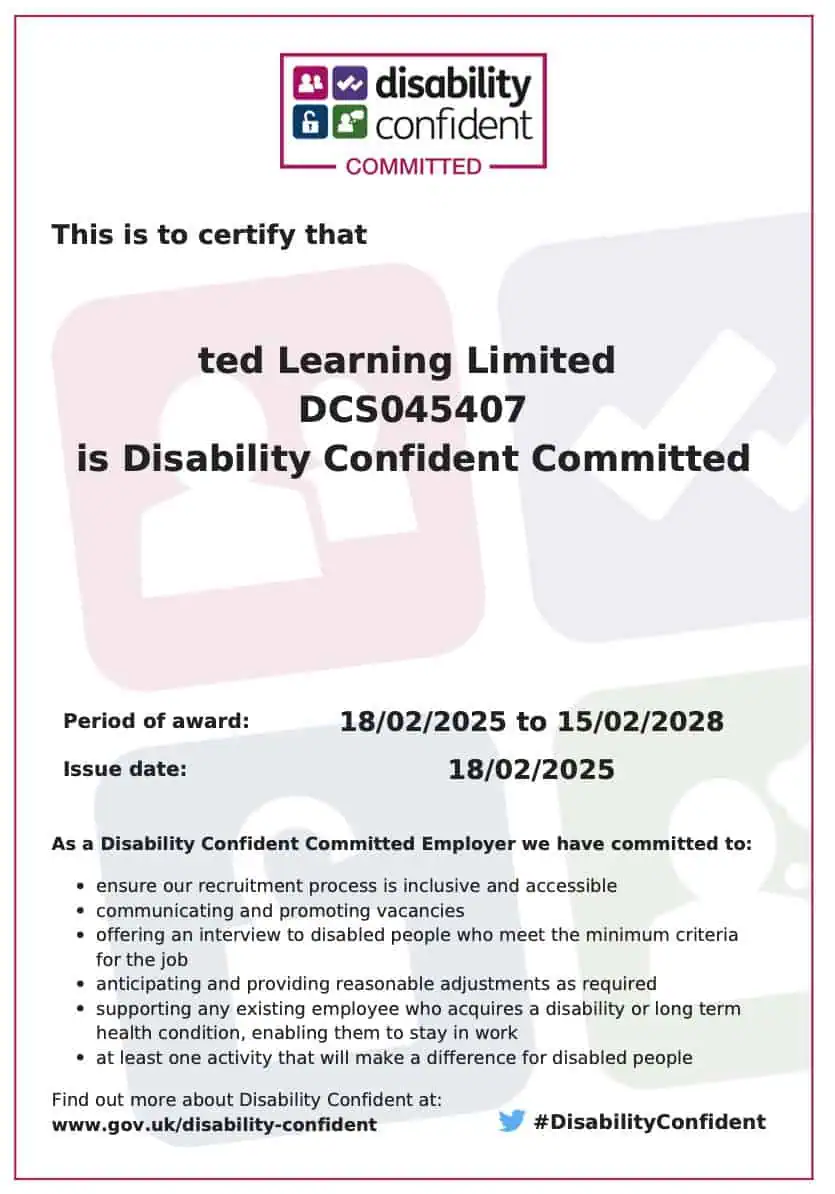Leading a Multi-Generational Team ...
Why this course?
Leading a Multi-Generational Team is a practical, insightful course designed to help managers unlock the full potential of multi-generational teams by improving communication, breaking down stereotypes, and building mutual respect across age groups.
Your business is thriving, and recent recruitment drives and graduate schemes have brought an exciting wave of fresh talent into the organisation. For the first time, many departments are made up of three different generations working side by side—each with unique perspectives, strengths, and working styles. In theory, this generational diversity in the workplace should enhance creativity, innovation, and strategic thinking.
But not all managers see it that way.
Some experienced leaders are frustrated by what they perceive as a lack of professionalism in the younger generation. Meanwhile, newly promoted managers are feeling blocked by more established colleagues who appear resistant to change. These assumptions and generalisations are creating communication challenges, cultural friction, and affecting team dynamics.
Our Leading a Multi-Generational Team course is designed to tackle these issues head-on. We help managers move away from generational stereotypes and focus instead on the value, insight, and experience that each individual brings—regardless of age.
This multi-generational leadership training explores how to manage age-diverse teams effectively, how to adapt leadership styles for different communication preferences, and how to foster inclusion and collaboration across generations. With a focus on real-life case studies, interactive exercises, and practical tools, the course equips leaders to build more cohesive, high-performing teams.
If your managers are struggling to bridge the gap between generations, Leading a Multi-Generational Team offers the skills and mindset shift needed to lead with empathy, flexibility, and impact.
What does it cover?
Leading a Multi-Generational Team: Understanding Generational Differences to Build Stronger Teams
In our Leading a Multi-Generational Team course, we begin by exploring the unique influences that shape each of the main generations currently active in today’s workforce. From Baby Boomers and Generation X to Millennials and Gen Z, we examine how these generational influences shape workplace expectations, communication preferences, and leadership perceptions—often leading to assumptions and unconscious bias that can affect team dynamics.
This Leading a Multi-Generational Team course uses our unique observational drama scenes to shine a light on how generalisations and stereotypes can impact working relationships. Through relatable scenarios, we explore both the challenges and the opportunities of managing age-diverse teams and how leaders can foster trust and collaboration across generations.
Using our Power of Personality (PoP©) tool, learners reflect on their own communication preferences and explore how these play out within a multi-generational team. The course helps participants recognise and value generational differences, while also identifying common ground. Leaders are supported to flex their approach and encourage others to do the same—strengthening team cohesion and promoting mutual respect.
As the UK workforce now includes four generations—Millennials (12.2 million), Generation X (11.4 million), Generation Z (4.3 million) and Baby Boomers (3.71 million)*—the need to develop inclusive, agile leadership has never been greater. This Leading a Multi-Generational Team course provides practical strategies and tools to support leaders in building inclusive environments where differences are celebrated, similarities are acknowledged, and collaboration thrives.
We conclude the session by equipping managers with actionable steps to lead multi-generational teams with confidence—creating a positive team culture rooted in understanding, flexibility, and shared success.
Really engaging, the way the trainer used language both spoken and bodily, to communicate to us as a group. The psychology behind why these behaviours happen/ may occur, relating it to our experiences and using the actors to provide in situ real time examples was very useful and helpful to use tools we’d learnt.
HOW DO WE DELIVER IT?
FACE TO FACE
IN THE TRAINING ROOM
LIVE ONLINE
VIA OUR VIRTUAL
CLASSROOM
COMMONLY ASKED QUESTIONS
ABOUT Leading a Multi-Generational Team
What is the Leading a Multi-Generational Team course about?
The Leading a Multi-Generational Team course equips managers and leaders with the insight and tools needed to lead age-diverse teams successfully. With three or more generations often working together for the first time in many organisations, this course helps break down age-based stereotypes and improve collaboration, communication, and productivity across generational divides.
Through drama-based learning, practical exercises, and interactive discussions, the course explores the different values, communication styles, and workplace expectations of each generation. It challenges assumptions, encourages mutual respect, and empowers leaders to foster inclusive, high-performing multi-generational teams.
By the end of the session, participants will have practical strategies to recognise and value generational differences, flex their leadership style, and actively promote a culture of collaboration and inclusion.
Why is leading a multi-generational team important in today’s workplace?
In today’s diverse workforce, it’s common to see Multi-Generational Teams made up of Baby Boomers, Generation X, Millennials, and Gen Z working together. Each generation brings its own values, communication preferences, and expectations—which can sometimes lead to misunderstandings or tension.
Effective leadership of Multi-Generational Teams is essential for building inclusive, collaborative, and high-performing workplaces. By understanding generational dynamics, leaders can reduce conflict, bridge communication gaps, and ensure that every team member feels respected and empowered.
Leading a Multi-Generational Team well doesn’t just improve day-to-day interactions—it strengthens employee engagement, supports retention across age groups, and helps create a forward-thinking culture where everyone can thrive.
Who should attend the Leading a Multi-Generational Team course?
The Leading a Multi-Generational Team course is ideal for line managers, team leaders, department heads, and HR professionals responsible for managing or supporting age-diverse teams. If your role involves leading people from different generations, this course provides the insight and practical tools needed to build stronger, more inclusive teams.
Whether you’re a newly promoted manager looking to build confidence or an experienced leader aiming to refine your inclusive leadership skills, this course will help you navigate generational differences and maximise the potential of a Multi-Generational Team. It’s particularly beneficial for organisations that want to improve communication, reduce bias, and create a culture where people of all ages can thrive together.
Are there additional licencing requirements or reports to complete?
No, there are no additional licensing requirements, questionnaires, or pre-course reports to complete for the Leading a Multi-Generational Team course. All the learning, reflection, and insight take place during the session itself—making it accessible, time-efficient, and easy to implement within busy schedules.
This practical approach means participants can focus fully on engaging with the content, developing inclusive leadership skills, and applying new strategies for leading a Multi-Generational Team without the burden of paperwork or complex admin.
Do you have to be from a specific age group to attend this training?
No….not at all. The <strong>Leading a Multi-Generational Team</strong> course is designed for leaders and managers of all ages and from all generations. Whether you’re a Millennial, Gen Z, Gen X, or Baby Boomer, this training offers valuable insights into working with and leading age-diverse teams.
In fact, the course works best when participants come from a range of generations, as this encourages open dialogue, shared perspectives, and mutual learning. The aim is to equip all leaders with the awareness, empathy, and communication tools needed to manage multi-generational teams effectively, regardless of their own age or experience.
What do you mean by ‘observational drama’ and ‘hot-seating’?
In the Leading a Multi-Generational Team course, we use powerful drama-based learning techniques to bring workplace scenarios to life.
Observational drama involves our professional actors performing a realistic workplace scene while participants observe. These scenarios are designed around real-world challenges, particularly those that arise in multi-generational teams. After watching the scene, learners discuss what they saw: What happened? Why did it happen? What was the impact? How might the individuals involved have felt? This reflective process encourages empathy, critical thinking, and a deeper understanding of age-diverse team dynamics.
Hot-seating builds on this by allowing learners to directly question the characters—our actors remain in role while being interviewed by participants. This interactive technique offers a unique opportunity to explore motivations, perspectives, and emotional responses in a safe, engaging way. It helps participants grasp the real impact of language, actions, and assumptions—making it a powerful tool for developing inclusive leadership in multi-generational teams.
THE ted Learning Guarantee!
We have been delivering highly impactful drama-based learning for over 13 years.
If for any reason you are not completely satisfied with the learning we provide and the learner feedback reflects this, we will put it right at no additional cost or give you your money back.
our clients who bought
this course also like...
Brave Conversations
Coaching Skills
Emotional Intelligence
Leading Through Change
Understanding Values and Impact
Download our Leading a Multi-Generational Team brochure
Discover more about how we can transform your workplace with our engaging, drama-based training solutions. Explore our full range of courses, from bite-sized learning to immersive programmes, creating lasting behavioural change.
Don’t miss out—download now and take the first step toward a more inclusive, high-performing workplace!
you’re in good company...

© 2019-2025 ted Learning Limited
ted Learning Limited is not affiliated with or endorsed by TED Conferences LLC, TED Talks, TEDx, or TED-Ed. Any references to ‘ted’ on this website refer solely to ted Learning Limited, a separate and independent UK-based organisation specialising in drama-based learning & workplace training.
NAVIGATION
POLICIES
CONTACT
ted Learning Limited
Registered Office First Floor, 85 Great Portland Street, London, W1W 7LT
Company number 12396710
Company No. 12647309 VAT No. 350-1579-16


